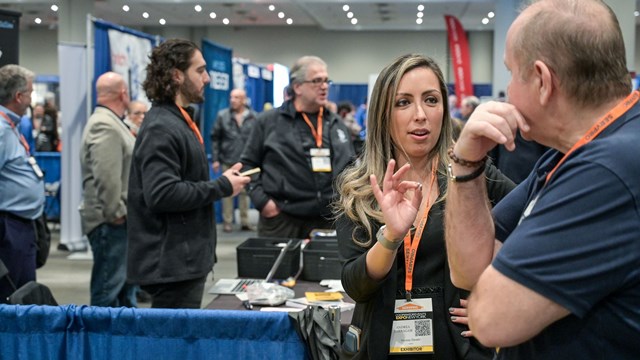One of the things that attracts people to a condo or HOA are the beautiful grounds and lush landscaping that surrounds the property. Because of the topography of Florida, depending on where a home is located, water could be plentiful or the area could be drought-stricken. It's almost always necessary for properties to use irrigation technology to keep their lawns, trees and shrubs healthy and green.
Anyone who has ever lived in a condo has probably seen the sprinklers go on and off, and while you may not think it’s that big of a deal, using the proper system and controlling water levels for all areas of the property can be a challenge. In the past, associations may have relied strictly on sprinkler systems or gardeners who would water the property with hoses, but irrigation systems have come a long way and today’s watering technology is cheaper, greener and much more sophisticated. Long gone are the days when installers would drop pipe haphazardly into the ground figuring that spraying around large volumes of water would make up for a hit-or-miss installation.
“Fifteen, twenty years ago, your typical residential irrigation installation didn't require more or less a design or simple methods of being able to institute what's called for as an efficient irrigation system,” Gary Gleichman, project manager at Treasure Coast Irrigation and Landscape in Hobe Sound, says. “That pretty much allowed anybody to just throw pipe in the ground, not calculate their water supply, how much water is available and at what pressure, the type of material they're using, the sprinkler heads and their performance rates, and then just simply throw a sprinkler head out in the lawn and expecting it to be looking green evenly throughout the property.”
New and Improved
Irrigation controllers have become extremely sophisticated, going as far as adding computer technology to improve its timing and diagnostics. Unfortunately for landscapers, this doesn’t end the need to connect the controller to every valve with a bundle of dedicated buried wire.
The programmable valve is another innovation that uses no electricity and is being sampled by some area landscapers. The valve can be programmed to open and close in any combination of settings based on a cycle of every seven times the water is turned on. It is small enough to be installed under a sprinkler head, or in another version, can be used in a water line. This innovation means that each sprinkler head can be programmed to open at different times than the others in the same zone.
“Two wire systems have reduced cost of materials and installation as they do not require a dedicated conductor for each zone valve,” Dale Davis of Nanak's Landscaping in Deerfield Beach says. “Systems that include telemetry connect to a user's PC and thereby can be monitored and controlled even from a remote location.”
Materials have also changed a lot in recent years, with newer type heads designed to last longer.
Spray head sprinklers are designed for more durability and uniform watering and are ideal for lawns, flowerbeds, and shrubs. Meanwhile, new plastic valves are constructed for reliability and are easy to install for a multi-valve system.
The science of watering a property has gotten really strong, but there are mistakes that you can make. “A lot of what we see which is a really big problem in improper irrigating is called mixed precipitation rate,” Gleichman says. “It typically means that a rotor sprinkler head has a slower precipitation rate than a spray head has a higher watering rate. And when those two types of sprinkler heads are put on the same zone, you can never have the proper water in any given area at one time. One area's getting over-saturated while the other area is not getting enough water, and there is no happy medium.”
“The second example of what we see—it's a number one problem in Florida—is watering dissimilar landscape materials,” Gleichman continues. “One being plants that have maybe a higher requirement for water, whereas the grass zones, which are a one-season climate grass down here, requires less water, longer intervals with some deeper root watering directions and move at one-third the rate of a typical spray head, thus providing a more even and less wasteful watering of landscapes.”
This common problem can be remedied with a rather simple and affordable replacement of antiquated spray heads with what is called MP rotator nozzles, Gleichman says. Unlike older spray heads, MP rotators spray water streams in multiple time frames based upon those precipitation rates,” Gleichman says. “The other thing we institute now is retrofitting the existing system with specific types of nozzles on the pop-up spray heads. The higher the pressure on somebody's sprinkler heads, the more gallons per minute they use, so therefore, your usage is up. So, if we pressure-regulate each sprinkler head and institute the MP rotator nozzle instead of the spray head nozzle, we can reduce their water in some zones by up to 40 percent.”
Licensed and Insured
Before hiring someone to fill your irrigation needs, a condo or HOA should make sure that the company is licensed and insured and has met the irrigation guidelines of the state of Florida. According to the Florida Irrigation Society (FIS), as quoted in the Florida Senate's “Review Regulation of Irrigation Contractors” 2012 interim report, “34 Florida counties regulate irrigation contractors by requiring a certificate of competency.” FIS recommends asking a potential contractor-hire a series of questions such as, 'Will you install a backflow prevention device?', 'Will you guarantee that overspray will be left to a minimum?' and 'Are you going to zone the sprays and rotors separately to prevent over watering?' in order to ensure the individual and company is qualified.
Be sure to also ask the irrigation company for a list of references, as well as a copy of their certificate of insurance before hiring them, FIS suggests. To get more information on hiring a reputable irrigation contractor, visit fisstate.org.
Water Conservation Education
Experts say associations need to deal with environmentalists and even government legislation when dealing with water issues. “South Florida has really, over the last 10 years, kind of tightened the noose on how much water we use because it has now been realized throughout the world that's a valuable resource that we're losing,” Gleichman says.
According to Doris Heitzmann, the program coordinator for Florida-Friendly Landscaping, which operates under the program operates under the Center for Landscape Conservation & Ecology, this is where the importance of education comes into play. “It really has to do with homeowners, residents, homeowner associations, condo associations, being educated and being aware of, that water is a precious and a limited resource, and we have to treat it like that. And the landscapes, they play a crucial role in that,” Heitzmann says.
Heitzmann holds attends multiple association meetings a month across Pinellas County, informing members on how to both make their irrigation systems more efficient and environmentally friendly. The basis of the Nine Florida-Friendly Landscape Principles include; plant the correct plant in the correct place, water efficiently, fertilize appropriately, use mulch, attract wildlife, manage yard pests responsibly, recycle yard waste, reduce storm water runoff and protect Florida waterfronts.
“So even in the condo associations, where the residents don't have their own yards and don't make direct decisions about landscaping, they also should learn about irrigation,” Heitzmann says. “So I'm all for education and communication because you might have homeowners who moved from New York or Pennsylvania down to Florida and they are unfamiliar with Florida-friendly landscaping or with Florida gardening altogether.”
Final Thoughts
No one should take their landscaping for granted and for a condo or HOA who wants to attract more people, they should really look into upgrading its irrigation system.
“One of the biggest things people don't recognize is your property value can go up almost by 20%, just by the landscape appeal,” Gleichman says. “I consider irrigation an insurance policy to keep that landscape lush and healthy as long as it's properly designed. Years ago, HOAs and POAs were very neglectful to irrigation systems. The board members and the people that I work with directly and the team members have more of a concern, and more questions, of the beautification process for what they really need to do to make their home values go up,” he says.
Keith Loria is a freelance writer and a frequent contributor to The South Florida Cooperator. Editorial Assistant Enjolie Esteve contributed to this article.





Leave a Comment